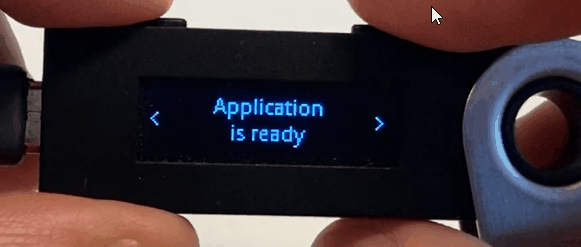
James Carter
How to Enable Blind Signing on Ledger-Life Time Guide

Cryptocurrency transactions have always been susceptible to fraudulent activities, hacks, and scams. The transaction details, including the sender’s address, recipient’s address, and transaction amount, are all visible on the blockchain. While it provides transparency to the users, it also exposes their information to the public. This is where the concept of blind signing comes in.
Blind signing is a process of signing transactions without revealing any transaction details to the signing party. In simple terms, it enables the user to sign the transaction without knowing what they are signing. This enhances the security and privacy of the transaction and reduces the risk of fraud, phishing attacks, and privacy breaches.
In this piece, we’ll go over why blind signing is useful on Ledger and show you how to set it up.
Benefits of Blind Signing on Ledger:
- Enhanced Security and Privacy:
Blind signing ensures that the transaction details are not visible to the signing party, thereby reducing the risk of privacy breaches and hacking attempts. With the transaction details hidden, it is virtually impossible for attackers to manipulate the transaction.
- Prevention of Phishing Attacks:
Phishing attacks are a common threat in the cryptocurrency world. Attackers often create fake wallet addresses and lure users into sending funds to a fake address. Blind signing can help prevent such attacks as the transaction details are not visible to the signing party. Therefore, even if the attacker creates a fake transaction, the user can sign it without revealing any information about the transaction.
- Reduced Risk of Fraud:
Blind signing reduces the risk of fraud by preventing attackers from accessing the user’s private keys. The private key is required to sign a transaction, and with blind signing, the user does not have to reveal their private key. This ensures that the private key remains secure and reduces the risk of fraudulent activities.
How to Enable Blind Signing on Ledger
Now that we have discussed the benefits of blind signing let’s dive into the process of enabling it on Ledger.
Step 1: Update your Ledger Firmware
Before enabling blind signing, ensure that your Ledger firmware is up to date. You can update your firmware using the Ledger Live app. Connect your Ledger device to your computer, open the Ledger Live app, and navigate to the Manager tab. If a firmware update is available, you will see an update prompt. Follow the on-screen instructions to update your firmware.
Step 2: Install the Appropriate App on your Ledger Device
Once your firmware is up to date, install the appropriate app on your Ledger device. Currently, the Ledger Live app supports blind signing for Bitcoin, Bitcoin Cash, and Litecoin.
To install the app, open the Ledger Live app, navigate to the Manager tab, and search for the app. Click on the app, and then click the Install button. The app will be installed on your Ledger device.
Step 3: Configure the App Settings to Enable Blind Signing
Now that the app is installed, you need to configure the app settings to enable blind signing. Connect your Ledger device to your computer, open the Ledger Live app, and navigate to the Accounts tab.
Click on the account you want to enable blind signing for, and then click on the Settings button. Under the transaction settings, you will see the “Blind signing” option. Turn on the “Blind signing” toggle to enable it.
Step 4: Use the App to Sign Transactions
With blind signing enabled, you can now sign transactions without revealing any transaction details. To sign a transaction, navigate to the Send tab in the Ledger Live app and enter the transaction details. Click on the Continue button, and then review the transaction details. Once you are satisfied, click on the Sign button. Your transaction will be signed without revealing any transaction details. You will then be asked to confirm the transaction on your Ledger device. Follow the on-screen instructions to confirm the transaction, and your signed transaction will be sent to the blockchain.
WATCH THE VIDEO BELOW FOR MORE CLARIFICATION
Tips for Safe Blind Signing on Ledger
- Keep your Ledger Firmware up to date.
As mentioned earlier, it is important to keep your Ledger firmware up to date. This ensures that you have access to the latest security features and bug fixes.
- Only install trusted apps on your ledger device.
Only install apps from trusted sources. Avoid installing apps from unknown sources or unverified developers, as they may contain malware or other security vulnerabilities.
- Keep Your Recovery Phrase Secure.
Your recovery phrase is the key to your cryptocurrency funds. Ensure that you keep your recovery phrase secure and never share it with anyone. If anyone gains access to your recovery phrase, they can access your cryptocurrency funds.
Disadvantages of blind signing on the ledger
While blind signing on Ledger has several benefits, it also has a few disadvantages that users should be aware of before enabling it. Here are ten potential disadvantages of blind signing on Ledger:
- Limited App Support
Currently, only a few cryptocurrency apps support blind signing on Ledger, including Bitcoin, Bitcoin Cash, and Litecoin. If you use other cryptocurrencies, you will not be able to use blind signing on those apps.
- Not Compatible with All Transactions
Blind signing is not compatible with all types of transactions. For example, it cannot be used for multi-signature transactions, which require multiple parties to sign the transaction. It also cannot be used for transactions that require specific information, such as the recipient’s address or the transaction amount.
- Limited Customization
Blind signing on Ledger is a binary option that is either enabled or disabled. There is no option to customize the level of blind signing or adjust the transaction details that are hidden.
- Reduced Transparency
Blind signing makes it difficult for users to review and confirm transaction details before signing them. While this enhances privacy, it reduces transparency and can increase the risk of errors or fraudulent transactions.
- Potential for Human Error
Since blind signing hides transaction details, it is possible for users to sign incorrect or fraudulent transactions without realizing it. This is especially true for people who haven’t done blind signing before or who hurry through the process.
- Not Foolproof
While blind signing enhances security and privacy, it is not foolproof. Attackers can still use social engineering tactics to trick users into signing fraudulent transactions, particularly if the user is not paying close attention or is under duress.
- Potentially Increased Transaction Fees
Since blind signing does not reveal transaction details, it is possible for the transaction fee to be higher than expected. This is because the app may not be able to accurately estimate the required fee based on the hidden transaction details.
- Reduced Interoperability
Blind signing is a proprietary feature of Ledger, and it may not be compatible with other hardware wallets or cryptocurrency apps. This reduces interoperability and can limit the user’s options when it comes to managing their cryptocurrency funds.
- Learning Curve
Blind signing can be confusing for users who are not familiar with the concept. Users may need to spend time learning how it works and how to use it properly, which can be a time-consuming process.
- Limited Use Cases
Blind signing is most useful for users who prioritize privacy and security over transparency and ease of use. For users who prefer to review transaction details before signing them or who use multi-signature transactions, blind signing may not be the best option.
Summary
Blind signing is a powerful security feature that enhances the privacy and security of cryptocurrency transactions. By enabling blind signing on your Ledger device, you can reduce the risk of phishing attacks, fraud, and privacy breaches. The process of enabling blind signing on Ledger is simple and straightforward, and the benefits are significant.
Latest
Blockchain
06 Feb 2026
Blockchain
05 Feb 2026
Blockchain
03 Feb 2026
Blockchain
20 Jun 2024
Blockchain
09 May 2024
Blockchain
19 Apr 2024













